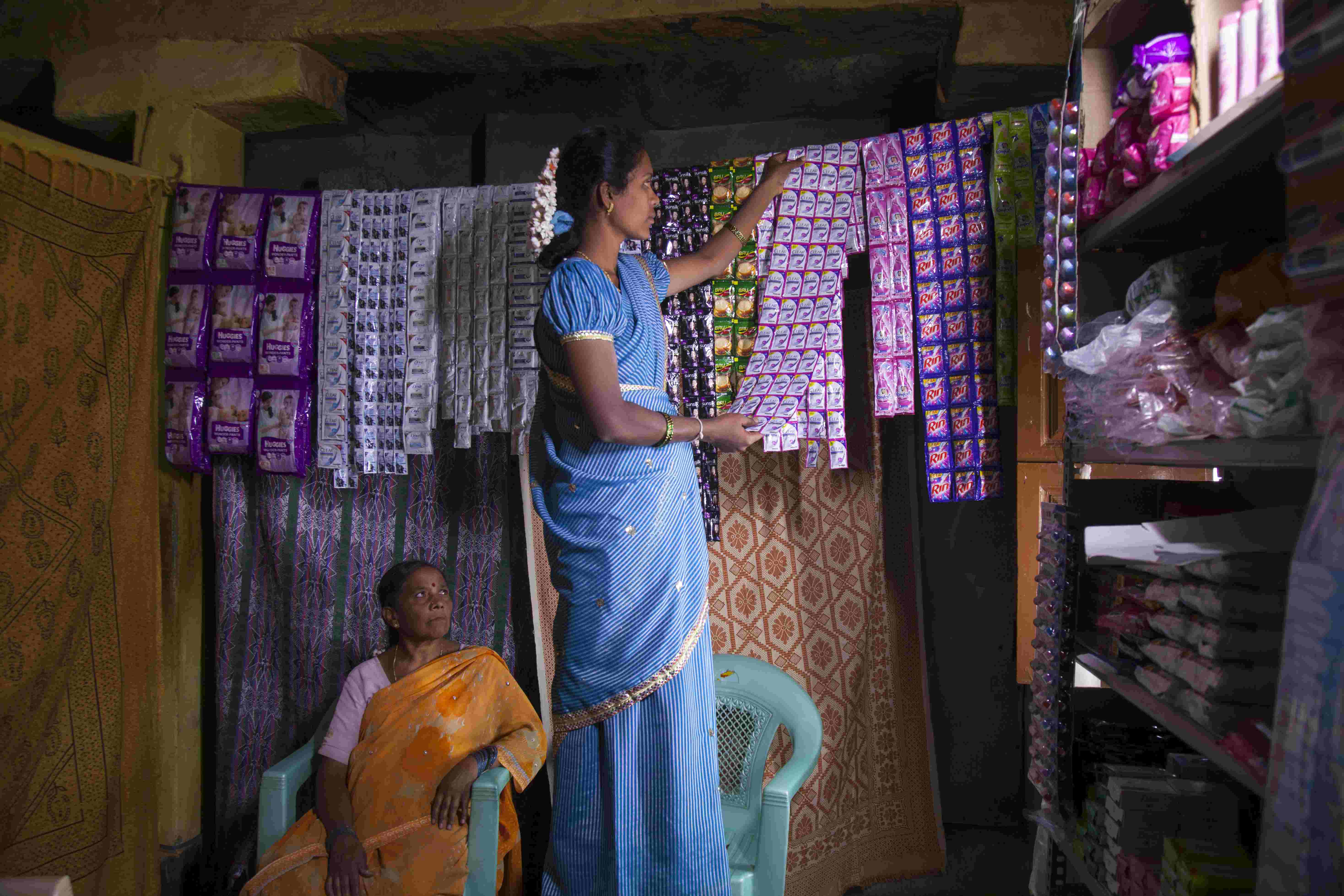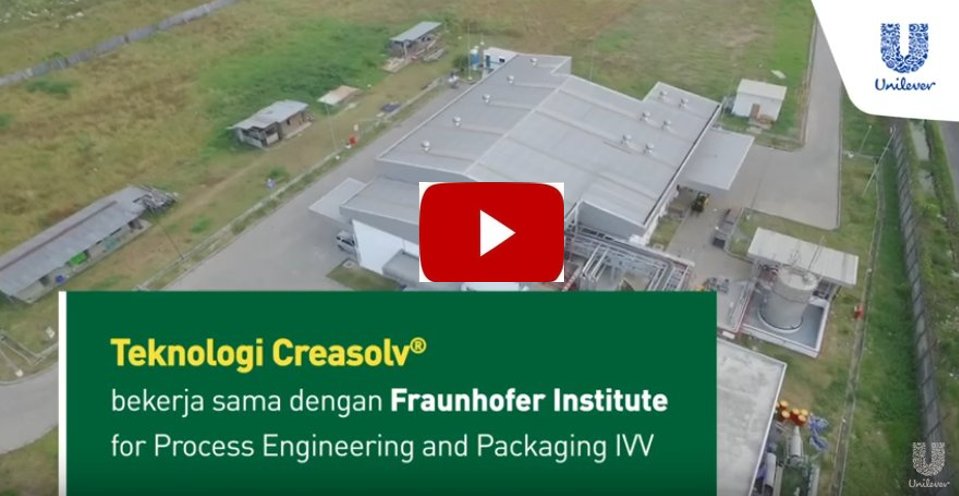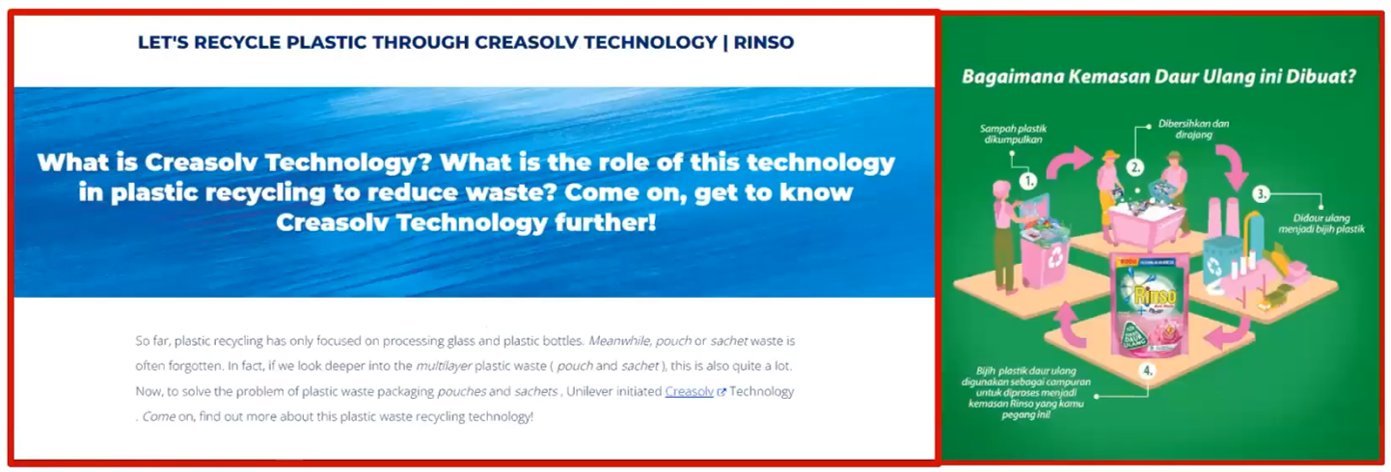CreaSolv® Pilot plant in Indonesia - Recycling of Polyethylene Sachets – Unilever
Small single-use plastic pouch packaging, so-called „sachets“ are very popular in developing and emerging countries, because they allow low-income consumers to buy small amounts of quality products that would otherwise be unaffordable to them. Empty flexible packaging is just thrown away or ends up in landfill because there exist no viable recycling technology and generally it lacks a waste logistic in those countries as well.
The fact that globally only 14% of all plastic packaging is recycled explains the reports about polluted beaches and garbage patches in the oceans and why Asia is seen as the main problem. But actually there is a growing awareness that every spot on this earth is affected and industrialized countries have a big problem with plastic packaging as well. Asia is for a global company like Unilever a very important market and so the search for a solution to the problem started early, because sachets are multi-layer plastic compound systems which cannot be processed by the usual mechanical recycling processes.
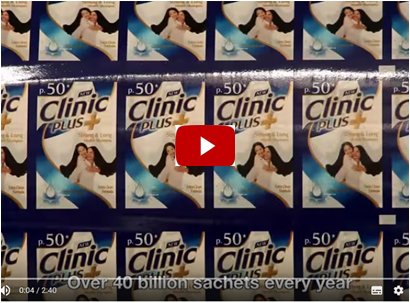 2010 - Unilever financed pilot projects in 4 countries aimed at using pyrolysis technique to turn sachet waste into fuel oil. With the encouraging project in India it could be demonstrated that fuel oil can be produced from sachets and other flexible plastic packaging waste1). The intended commercialization failed due to the high cost for the collection and processing of plastic waste in relation to the created fuel value.
2010 - Unilever financed pilot projects in 4 countries aimed at using pyrolysis technique to turn sachet waste into fuel oil. With the encouraging project in India it could be demonstrated that fuel oil can be produced from sachets and other flexible plastic packaging waste1). The intended commercialization failed due to the high cost for the collection and processing of plastic waste in relation to the created fuel value.
2011 - the first contact was made betweenUnilever and Fraunhofer IVV & CreaCycle and it developed into a close cooperation with the objective to modify and adapt the CreaSolv® Process, so that a CreaSolv® Pilot plant for sachet recycling can be built in Indonesia.
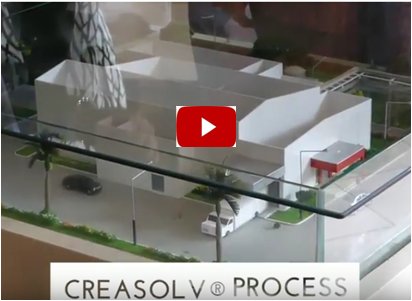 2015 - After 3 years intensive development work the large-scale trials were successfully concluded and Unilever placed the orders for the construction of the pilot plant.
2015 - After 3 years intensive development work the large-scale trials were successfully concluded and Unilever placed the orders for the construction of the pilot plant.
2017 - The plant was completed by LOEMI GmbH in Germany3,4,5). After the successful acceptance the plant was dismantled, transported to Indonesia and reassembled.
November 2018 - Unilever announced that the CreaSolv® Pilot plant is fully operational and they are ready to start examining the technical and commercial viability of this technology6). If successful the process will be commercialized and the technology will be made open source, available also to investors and competitors.
The CreaSolv® Plant is designed for high-quality polyethylene (PE) recycling, because 60% of the layers consist of this polymer. The recovered PE will be used for the production of new sachets. The energy consumption for the recycling of 6 kg PE is the same as for the production of 1 kg virgin polymer with the new technology, thus enabling a circular economy with a smaller environmental footprint. The facility currently processes approximately 3 tons sachet waste per day and Unilever invested approximately 10 Millionen Euros7).
A successful commercialization depends on a functioning waste collection infrastructure, supported by government and industry, so that a substantially larger volume of several thousands of tons of flexible packaging waste can be made available.
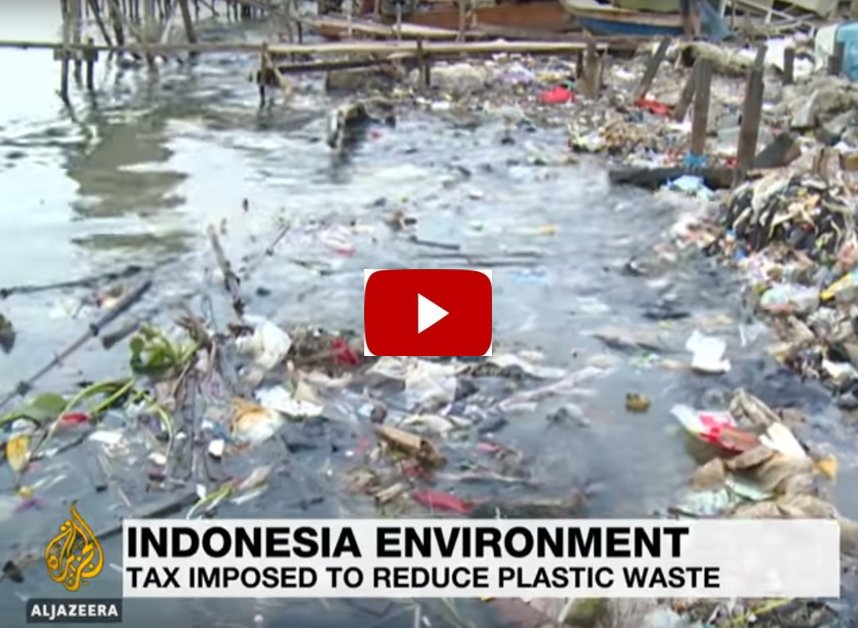 July 2019 - Unilever Indonesia published the following commitment on YouTube11) and its own homepage12). The text was translated from Indonesian. To watch the video click on the picture (right).
July 2019 - Unilever Indonesia published the following commitment on YouTube11) and its own homepage12). The text was translated from Indonesian. To watch the video click on the picture (right).
Unilever's Commitment to Solve the Plastic Waste Issue in Indonesia
At the end of the value chain of the packaging of our finished products used by consumers, we have made large investments to overcome the problem of plastic packaging waste, namely:
- Develop new business models to support circular economy with the re-use of old sachets and pouches in new packaging materials. Through the innovative CreaSolv®️ Technology we will be the First in the world, which will be able to recycle multilayer plastic packaging waste for the production of new packing products.
- With the concept of Circular Economy, packaging plastic waste will continue to be recycled into new packaging, and do not end up in landfill or the environment. In the later commercial scale, this technology has the potential to reduce the impact of CO2 by 7.800 tons/year for each operating unit, which is equivalent to 8.200 tons of flexible plastic.
- We will cooperate with government and industry to promote the application of the concept of Circular Economy for plastic packaging on a broad base.
November 2019 - In their update "Waste & Packaging" Unilever informs: We have proven through large scale industrial trials that the CreaSolv®️ Recycling technology is a technically viable solution to recycling sachets.13)
November 2021 – The Corona pandemic since 1Q 2020 also influenced the CreaSolv® Project, but in their post “Waste-Free World” on their homepage14) Unilever reports “We are also currently operating the CreaSolv® Pilot facility …. located in the PT Trias Sentosa factory complex in Sidoarjo. From January 2019 to February 2021, this plant successfully recycled around 94,1 tons of multilayered packaging waste and produced around 46,2 tons of recycled polyethylene (PE). This technology has the potential to absorb three tons of flexible plastic packaging waste per day at a commercial level. Moreover, in 2021 we launched RINSO’s special packaging that uses the results of this factory's recycled materials.”
This RINSO Anti-Stain has been featured in the IKLAN TV advertisement “Plastic Garbage Everywhere” from August 2021 on IKLAN TV15).
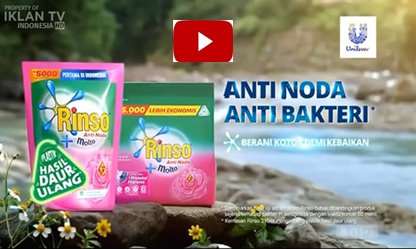
Actually, the CreaSolv® Pilot plant has a Technology Readiness Level of TRL 6-7.
January 2022 – In order to answer the Question: “Why do you continue to sell plastic sachets?” on their homepage16), Unilever explains, that they are guided by the Waste Hierarchy:
- Prioritize Plastic-to-Plastic Recycling
- If not possible, support solutions that develop local recycling (example: Misis Walastik sachet collection program which converts sachet waste into school desks.
- Without suitable recycling solutions due to a lack of comprehensive waste management infrastructure, explore initiatives that recover energy from waste. This is absolutely a last resort that provides an alternative to waste ending up in the environment or landfill, while recycling infrastructure is developed and scaled up.
With programs in place across the world, Unilever continues to invest in a range of solutions, including partnerships in waste collection and processing, buying recycled plastic and supporting well-designed Extended Producer Responsibility schemes into which Unilever directly pays for the collection and processing of its packaging.
Unilever: "In markets with comprehensive waste infrastructure, we know it's possible to recycle flexible packaging at scale. That's why we’re members of CEFLEX, a consortium working to make flexible packaging in Europe circular by 2025."
In Indonesia, a country without disposal infrastructure, Unilever is working on a range of solutions in order to reduce dependence on multi-layer sachets:
- Refill – Reuse – Rethink program. Testing of refill solutions. In Bintaro in Indonesia, a refilling station was launched in the Saruga Packaging Free Shopping Store.
- Recyclable Sachets. Shifting to sachets made from a single type of plastic instead of multiple layers.
- Alternative Materials. Trialing materials other than plastic for sachets, such as paper which is widely recycled and collected.
- Supporting Collection and Recycling Infrastructure. Trialing Plastic-to-Plastic Recycling with the CreaSolv® Pilot. This is Physical Recycling (synonym: Material Recycling) leaving the polymer intact so that it can be reused.
Literature
- WWW Waste Management World “Unilever utilizes Pyroysis to create Fuel from Sachet Packaging” on 14.08.2012, last check 2018.11.12 – Link
- Unilever “Sachets – Pyrolysis project in India – video published 24.04.2012 on Youtube – Link
- Unilever Homepage “CreaSolv®: a breakthrough recycling technology we want to share”, published 26.05.2017, last check 12.11.2018 – Link
- Labelpack Packlabel “Recycling für kleine Beutelverpackungen” vom 17.05.2017, last check 12.11.2018 – Link
- WISNU TV - Unilever Indonesia Media Conference in Jakarta on 17 May 2017 - “Sachet Recycling with the CreaSolv® Process” - video published 11.06.2017 on Youtube – Link
- Unilever Homepage “Our solution for recycling plastic sachets takes another step forward” published 08.11.2018 - Link
- AntaraNews „Kumpulkan plastik sachet, kini ada teknologi daur ulangnya“ published 27 October 2018 – Link
- Unilever Homepage “ Unilever and Veolia sign collaboration agreement on Sustainable Packaging” published 24.10.2018 – Link
- ECOreporter “Veolia und Unilever: Partnerschaft für mehr Recycling” veröffentlicht am 25.10.2018 – Link
- Al Jazeera "Indonesia taxes shoppers to reduce plastic waste" published on YouTube on 15.09.2016 - Link
- Komitmen Unilever Untuk Mengatasi Sampah Plastik di Indonesia, published on July 29, 2019 on Youtube - Link
- Komitmen Unilever dalam Mengatasi Masalah Sampah Plastik - published July 29, 2019 - Link
- Unilever Homepage "Waste & Packaging" published 12 November 2019
- Unilever Homepage "Waste-Free World?" published 26.11.2021 - Link
- IKLAN TV advertisement "RINSO Anti Noda "Sampa Plastik Dimana Mana" (transl. RINSO Anti Stain "Plastic Garbage Everywhere") from 02.08.2021 - no longer available
- Unilever Homepage “Why do you continue to sell sachets?” published 25.01.2022 – Link
